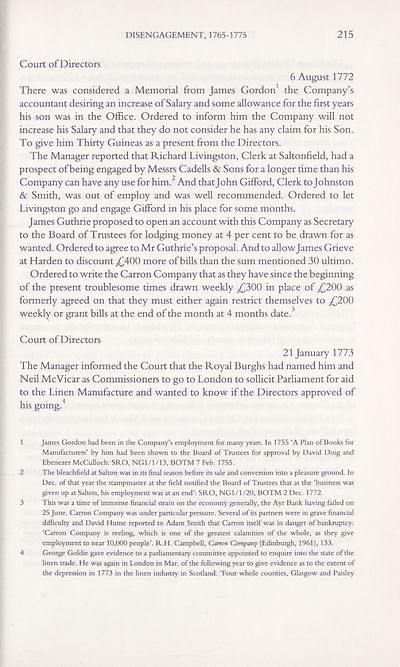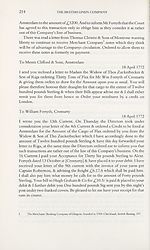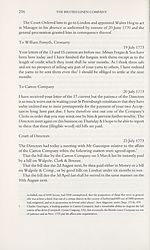Series 5 > British Linen Company, 1745-1775
(232) Page 215
Download files
Complete book:
Individual page:
Thumbnail gallery: Grid view | List view

DISENGAGEMENT, 1765-1775
215
Court of Directors
6 August 1772
There was considered a Memorial from James Gordon1 the Company’s
accountant desiring an increase of Salary and some allowance for the first years
his son was in the Office. Ordered to inform him the Company will not
increase his Salary and that they do not consider he has any claim for his Son.
To give him Thirty Guineas as a present from the Directors.
The Manager reported that Richard Livingston, Clerk at Saltonfield, had a
prospect of being engaged by Messrs Cadells & Sons for a longer time than his
Company can have any use for him.2 And thatjohn Gifford, Clerk to Johnston
& Smith, was out of employ and was well recommended. Ordered to let
Livingston go and engage Gifford in his place for some months.
James Guthrie proposed to open an account with this Company as Secretary
to the Board of Trustees for lodging money at 4 per cent to be drawn for as
wanted. Ordered to agree to Mr Guthrie’s proposal. And to allowjames Grieve
at Harden to discount £400 more of bills than the sum mentioned 30 ultimo.
Ordered to write the Carron Company that as they have since the beginning
of the present troublesome times drawn weekly £300 in place of £200 as
formerly agreed on that they must either again restrict themselves to £200
weekly or grant bills at the end of the month at 4 months date.3
Court of Directors
21 January 1773
The Manager informed the Court that the Royal Burghs had named him and
Neil McVicar as Commissioners to go to London to sollicit Parliament for aid
to the Linen Manufacture and wanted to know if the Directors approved of
his going.
1 James Gordon had been in the Company’s employment for many years. In 1755 ‘A Plan of Books for
Manufacturers’ by him had been shown to the Board of Trustees for approval by David Doig and
Ebenezer McCulloch: SRO, NG1/1/13, BOTM 7 Feb. 1755.
2 The bleachfield at Salton was in its final season before its sale and conversion into a pleasure ground. In
Dec. of that year the stampmaster at the field notified the Board of Trustees that as the ‘business was
given up at Salton, his employment was at an end’: SRO, NG1/1/20, BOTM 2 Dec. 1772.
3 This was a time of immense financial strain on the economy generally, the Ayr Bank having failed on
25 June. Carron Company was under particular pressure. Several of its partners were in grave financial
difficulty and David Hume reported to Adam Smith that Carron itself was in danger of bankruptcy:
‘Carron Company is reeling, which is one of the greatest calamities of the whole, as they give
employment to near 10,000 people’. R.H. Campbell, Canon Company (Edinburgh, 1961), 133.
4 George Goldie gave evidence to a parliamentary committee appointed to enquire into the state of the
linen trade. He was again in London in Mar. of the following year to give evidence as to the extent of
the depression in 1773 in the linen industry in Scotland. ‘Four whole counties, Glasgow and Paisley
215
Court of Directors
6 August 1772
There was considered a Memorial from James Gordon1 the Company’s
accountant desiring an increase of Salary and some allowance for the first years
his son was in the Office. Ordered to inform him the Company will not
increase his Salary and that they do not consider he has any claim for his Son.
To give him Thirty Guineas as a present from the Directors.
The Manager reported that Richard Livingston, Clerk at Saltonfield, had a
prospect of being engaged by Messrs Cadells & Sons for a longer time than his
Company can have any use for him.2 And thatjohn Gifford, Clerk to Johnston
& Smith, was out of employ and was well recommended. Ordered to let
Livingston go and engage Gifford in his place for some months.
James Guthrie proposed to open an account with this Company as Secretary
to the Board of Trustees for lodging money at 4 per cent to be drawn for as
wanted. Ordered to agree to Mr Guthrie’s proposal. And to allowjames Grieve
at Harden to discount £400 more of bills than the sum mentioned 30 ultimo.
Ordered to write the Carron Company that as they have since the beginning
of the present troublesome times drawn weekly £300 in place of £200 as
formerly agreed on that they must either again restrict themselves to £200
weekly or grant bills at the end of the month at 4 months date.3
Court of Directors
21 January 1773
The Manager informed the Court that the Royal Burghs had named him and
Neil McVicar as Commissioners to go to London to sollicit Parliament for aid
to the Linen Manufacture and wanted to know if the Directors approved of
his going.
1 James Gordon had been in the Company’s employment for many years. In 1755 ‘A Plan of Books for
Manufacturers’ by him had been shown to the Board of Trustees for approval by David Doig and
Ebenezer McCulloch: SRO, NG1/1/13, BOTM 7 Feb. 1755.
2 The bleachfield at Salton was in its final season before its sale and conversion into a pleasure ground. In
Dec. of that year the stampmaster at the field notified the Board of Trustees that as the ‘business was
given up at Salton, his employment was at an end’: SRO, NG1/1/20, BOTM 2 Dec. 1772.
3 This was a time of immense financial strain on the economy generally, the Ayr Bank having failed on
25 June. Carron Company was under particular pressure. Several of its partners were in grave financial
difficulty and David Hume reported to Adam Smith that Carron itself was in danger of bankruptcy:
‘Carron Company is reeling, which is one of the greatest calamities of the whole, as they give
employment to near 10,000 people’. R.H. Campbell, Canon Company (Edinburgh, 1961), 133.
4 George Goldie gave evidence to a parliamentary committee appointed to enquire into the state of the
linen trade. He was again in London in Mar. of the following year to give evidence as to the extent of
the depression in 1773 in the linen industry in Scotland. ‘Four whole counties, Glasgow and Paisley
Set display mode to:
![]() Universal Viewer |
Universal Viewer | ![]() Mirador |
Large image | Transcription
Mirador |
Large image | Transcription
Images and transcriptions on this page, including medium image downloads, may be used under the Creative Commons Attribution 4.0 International Licence unless otherwise stated. ![]()
| Scottish History Society volumes > Series 5 > British Linen Company, 1745-1775 > (232) Page 215 |
|---|
| Permanent URL | https://digital.nls.uk/127333833 |
|---|
| Description | Over 180 volumes, published by the Scottish History Society, containing original sources on Scotland's history and people. With a wide range of subjects, the books collectively cover all periods from the 12th to 20th centuries, and reflect changing trends in Scottish history. Sources are accompanied by scholarly interpretation, references and bibliographies. Volumes are usually published annually, and more digitised volumes will be added as they become available. |
|---|


